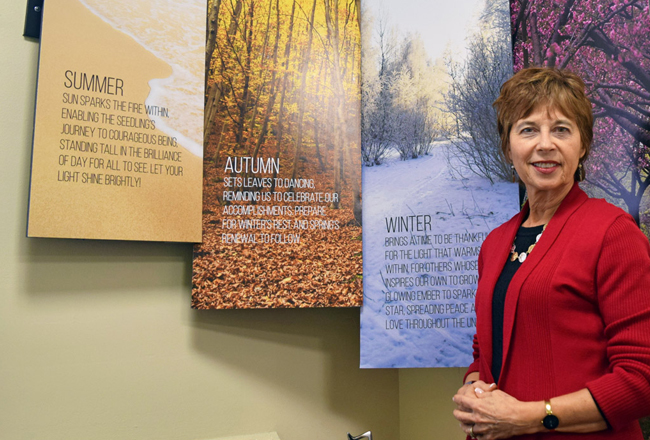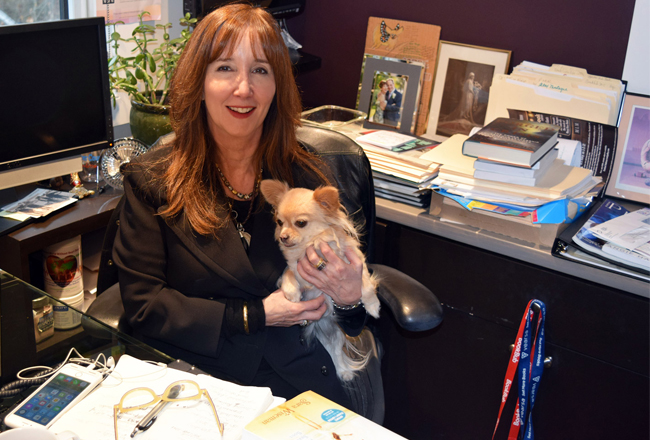When Christel Autuori was invited to become the director of the Institute for Holistic Health Studies at Western Connecticut State University in Danbury in 2015, she was somewhat puzzled by the scope of her responsibilities. “When I asked, ”˜What”™s my job description?”™, I was told, ”˜Well, there really isn”™t one,”™” she recalled.
In retrospect, Autuori recognized that the vagueness of her new duties reflected the institute”™s unusual place within the university. Launched in 2001, the Institute for Holistic Health Sciences is part of the university”™s Department of Health Promotion and Exercise Sciences and had previously coordinated a health fair with the now-defunct Connecticut Holistic Health Association and sponsored certification programs for reflexology and shamanic practitioners that have been discontinued. Its staff consisted solely of its director and it did not have an office on campus until Autuori accepted that position.

Autuori, a health and wellness professional who began her career as a dental hygienist and later refocused to become a registered yoga teacher, Reiki master and integrative health coach, also operates her own part-time business, Integrative Health CT, which she founded in 2012. She has been an adjunct faculty member at the college since 2014, teaching a course on holistic and integrative health principles.
“When I came on, one of my goals was to let people know about this (institute) because I had been teaching here and never really saw much that was going on,” she said. “Maybe I wasn”™t looking in the right places.”
Eager to make the Institute more visible on the Danbury campus, the new director in her first semester on the job created a Wellness Wednesday series of six free one-hour workshops for students and university employees that she scheduled during a lunch hour.
“I found out that I could get students if they were incentivized with extra credits,” she said. “And the difficulty in getting staff to come is that they have a half-hour to lunch. People are welcome to bring their food to these workshops, but the staff would only get to stay for half of the presentation.”
Workshop participants instead were “mostly people from the community,” said Autuori, “which is great because my personal goals are to become a resource for the greater Danbury community and for practitioners in the area. It would appear the majority of people who have time in the middle of the day are retirees.”
Through word-of-mouth marketing, university press releases and Autuori”™s own promotion of the institute to students in her private work as a yoga teacher, awareness has slowly begun to grow, she said. Looking to boost the institute”™s credibility, she has brought in nationally prominent guest speakers, including surgeon and best-selling author Dr. Bernie Siegel and holistic stress management expert Brian Luke Seaward.
“We partnered with Danbury Hospital to bring Seaward here and the next day he did a presentation up at the caregiver center at the hospital,” Autuori said, adding that television broadcaster Joan Lunden, who penned the foreword to Seaward”™s book “Stressed is Desserts Spelled Backwards,” appeared at Seaward”™s events.
In promoting both the institute and the concepts of holistic and integrative health, Autuori emphasizes their diversity. The subjects of last semester”™s Wellness Wednesday workshops ranged from acupuncture for stress management to decoding the ingredients on food labels to using poetry and journaling as a mental health exercise.
“Health is multidimensional,” said Autuori. “I don”™t like the term ”˜holistic”™ because people think of us as old hippies. But holistic really means the big picture, the multidimensions involved in health: your family, your community affiliations, your affiliations. It it is mind-body, it is many different things.”
For the spring semester, Autuori is planning a series of Tuesday workshops focused on meditation tied to Sahaja Yoga, a practice that does not require a mat. Within the Western Connecticut community, the Institute for Holistic Health Studies hosts stress-buster workshops at the end of each semester, with visiting participants that include shamanic drummers and therapy dogs. And the Health Promotion and Exercise Sciences curriculum has students working with Institute resources to develop and implement needs assessment projects.
“In the last couple of years, those projects have been on stress management, which seems to be a perennial problem,” Autuori said. “They look to the Institute for guidance and ideas and any healing modalities they can interpret with that.”
Autuori said the institute is the only endeavor of its kind among Connecticut”™s higher education institutions. She expressed concern that tomorrow”™s health and wellness practitioners will lack holistic skills because of an obsession with digital technology.
“The more we are connected electronically, the less we are connected interpersonally,” she warned. “I have a friend at the University of Bridgeport in a professional program that is teaching practitioners, and she told me one day, ”˜My students told me they don”™t know how to talk to their patients.”™ If they can”™t talk to their patients, they can”™t read body language because they only know how to type.”




















